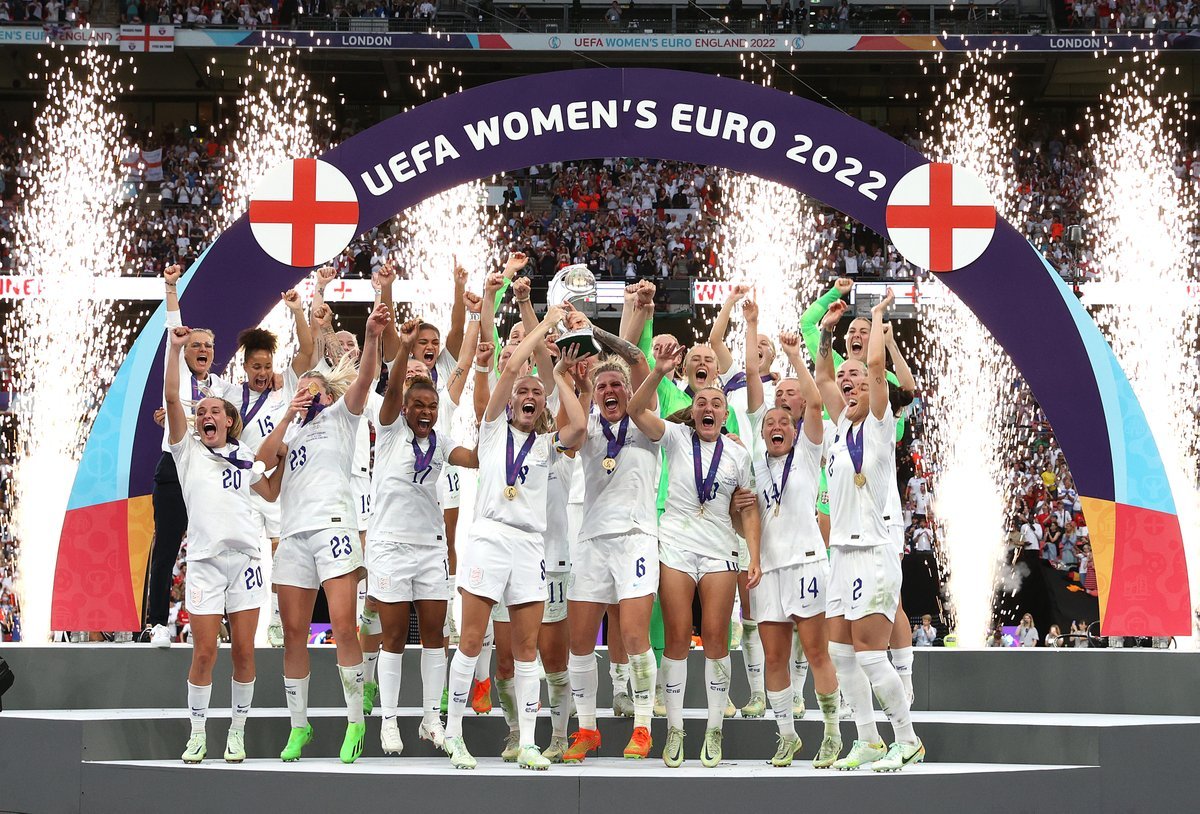
Insight
Bringing It Home:
Why the Women’s Euros is a chance for all of us to invest in the future of football
By Izzy Duddy,
Consultant
Yesterday, 87,192 people made the pilgrimage to Wembley Stadium for the final of the UEFA Women’s Euros 2022, and most of them did not leave disappointed. Our Lionesses fought tooth and nail against a worthy opposition, but an extra time goal from Chloe Kelly secured the win for England. Football finally came home.
The UEFA Women’s Euros 2022 has showcased the best of English football. The atmosphere at all games has been electric, with Euros fever once again sweeping the country. The women’s game and its accessibility has opened up the tournament to all ages, attracting both loyal fans and new supporters.
The feeling of change in the women’s game is palpable. This year’s season of the Women Super League (WSL) had a 176% rise in attendance on the season five years previous, Sky Sports signed a broadcasting deal with the WSL, and big derbies and Women’s Champion’s League games are increasingly being played at the main stadiums. Clubs are announcing the contract renewal of men’s and women’s team managers in the same release and using both male and female players in their kit launches and commercial opportunities. The Lionesses’ success this summer will only serve to boost this, and I for one look forward to a louder chorus of “Beth Mead’s on fire” ringing round Borehamwood.
However, when we look at the status of women’s football in England, we should be careful not to draw direct comparisons to the men’s game. It couldn’t be more different.
After seeing the sheer talent on display from all countries at the Euros, it’s easy to forget the barriers these players have faced on their journey to elite level football. According to The FA, 91% of primary and secondary schools in England offer football as part of the curriculum, but only 63% of schools offer this equally to both boys and girls. Additionally, only 40% of schools offer football to girls as an extra-curricular activity. Anecdotally, we know that girls can often feel discouraged to take part in football due to the prevailing attitude that it’s a male sport, and that they don’t belong.
These statistics show that at a basic level, schools do not have the resources to encourage girls into football, whether that is due to gaps in specialist teaching capacity or simply through a lack of mentorship. The FA has done some excellent work in this area: Lexington is proud to have supported them with their #LetGirlsPlay campaign to get girls across the country taking part in the Biggest Ever Football Session, and connecting MPs with their local grassroots facilities so they can see the value of sport in their community. Despite these great initiatives, there is still a very long way to go to address the gap. If the incoming Prime Minister wants to look at ways of strengthening communities and tackling childhood obesity, then they should look no further than the access disparity for girls in schools, and make this a priority on their agenda in the upcoming parliamentary session.
And what about those women who reached football at a later stage? We often see an uptick of women taking part in football following major tournaments, but each time we also see that this trails off, as we don’t have the sustainable infrastructure in place to keep them playing. This time, we cannot allow this to happen.
I first started playing football in 2019 after watching the Women’s World Cup in France. As someone who had never played before, or even shown an interest in organised sport, I was struck by the lack of clubs around London that offered casual training to complete beginners. Most clubs either required several years of experience, or three nights a week in training sessions – neither of which I had. I was lucky, and now play football most weekends, as well as occasionally during the week with my five-a-side team. Over the COVID-19 period this was my saving grace, and I’ve come away with better fitness, better mental health, and a whole bunch of new fantastic friends.
However, many women are not feeling these benefits. Recent data from our client Nuffield Health showed that 47% of women have done no vigorous exercise in the last year, compared to 34% for men. Women were more likely to report barriers to exercise than men, with 67% citing a lack of motivation compared with 51% for men, and 35% of women not knowing where to start versus 28% of men. These shocking statistics are indicative of the challenge women’s football faces, but also of the opportunity the Euros legacy presents in this country. We must capitalise on the Lionesses’ success to welcome more women into grassroots football, but also ensure the infrastructure is in place to keep them there.
Of course, this is a task for Government, sporting bodies and regional councils to secure the funding and infrastructure to allow this. But there is also a role for companies as part of their responsible business approaches to look at their own outreach, and consider how they can support and empower women and girls to play. Even providing simple things like bibs, flags, and footballs can go a long way at the grassroots level, and demonstrates business’s commitment to employee health and their local community.
This tournament has provided a unique opportunity to showcase the best of women’s sport and set a legacy for all sports going forward – not just football. The Euros is an opportunity to highlight the positive stories, but also address the severe inequalities that still exist in football so that we can build a sustainable future for all those wanting to get involved in the beautiful game. In the words of Ian Wright following England’s storming 4-0 win against Sweden, “if girls are not allowed to play football just like the boys in their PE lessons after this tournament, then what are we doing?”

“if girls are not allowed to play football just like the boys in their PE lessons after this tournament, then what are we doing?” - Ian Wright
Seeing the Lionesses’ victory at Wembley has certainly been emotional for many of us who have watched the women’s game develop in recent years, and even more so for those players who have worked twice as hard to be recognised for their talent.
But the result of the tournament doesn’t matter – we’ve already brought football home.
Now we owe to it to women and girls up and down the country to keep it here.
Associate Director Amy Trenter and her teammates on the final whistle (Video credit @MiaEtheridge)












